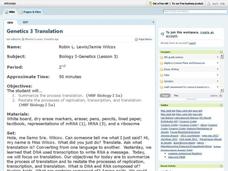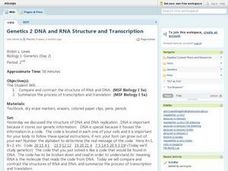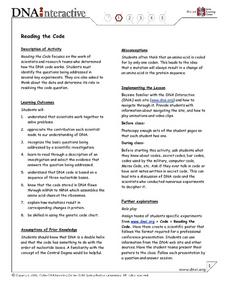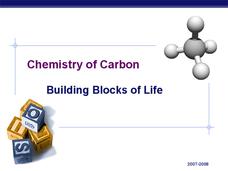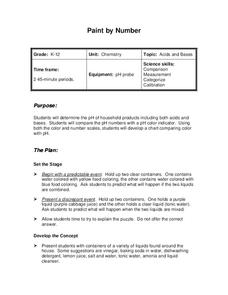Curated OER
Reading the Code
In this DNA worksheet, students access a website to read about the scientists who make significant contributions to the DNA puzzle. Students complete 7 short answer questions based on the reading. Then students complete 3 short answer...
Curated OER
Chemical Magic
Students identify acids and bases. In this chemistry lesson, students use red cabbage juice as an indicator of whether the liquid is an acid or base. Students discuss the results.
Curated OER
Genetics 3 Translation
Ninth graders first summarize the process of translation, and then they identify and restate the processes of DNA replication, transcription, and translation in their own words. They also define the purpose of each and identify what the...
Curated OER
Soiled Again
Students propose and perform an experiment using the scientific method. The purpose of the experiment is to discern some earth materials or combinations of earth materials that best increases the pH of "acid rain". From the results of...
Curated OER
Modeling Protein Structure
Students examine amino acids and discuss the properties of side chains. In this proteins lesson students demonstrate the foldings of peptides.
Curated OER
pH and Red Cabbage Juice
Middle schoolers review properties of materials and define what pH tells them about matter. In this pH levels lesson plan, students determine whether materials are acids or bases using indicator substances.
Curated OER
Anaerobic Lactic Acid System Exploration
Students explore the role, functions, and conditions in which lactic acid is produced. They share ideas to complete a KWL on the vocabulary for the lesson then research these ideas futher on the internet using a set of prompting...
Consortium for Ocean Science Exploration and Engagement (COSEE)
Carbon Dioxide & Krill: Impacts
What effects do temperature and carbon dioxide levels have on the zooplankton of Antarctica? This concluding lesson plan in a short unit on climate change and the ocean helps environmental scientists answer these questions. After...
Curated OER
Sorting Plastics For Recycling
First, young chemists practice polymer identification by density and flame tests. With the data collected, they propose a method of separating polyethylene from other plastics and determine what property makes it desirable for recycling....
Curated OER
DNA and RNA Structure and Transcription
Young scholars compare and contrast the structure of RNA and DNA.They summarize the process of transcription and translation. The lesson plan uses an inquiry model and the use of codes in DNA.
Curated OER
Acids and Bases
In this acids and bases worksheet, students will identify the molecules represented in a diagram equation and determine if an acidic or basic solution has been produced. Students will list the properties of acidic and basic solutions....
Royal Society of Chemistry
Chemistry Masterclass—Chemistry Outreach
Immerse your chemistry class in the world of organic chemistry! Science scholars isolate acetaminophen from an over-the-counter sample during an intense and interesting lab. Groups use many different separation and analysis techniques to...
Teach Engineering
Imagining DNA Structure
Let's get a closer look at DNA and other molecular structures. The first lesson in the series of four introduces a variety of imagining techniques that engineers and scientists use to visualize molecular structures. The resource presents...
Curated OER
Summer Science Recipes: Experiments on the Grill and in the Kitchen
Generate ideas about the most scientifically sound ways to prepare foods safely and efficiently during the summer season. Learners will use the GED Connection Science Workbook, so they can practice the skills needed to prepare for the...
Curated OER
How DNA Controls the Workings of the Cell
In this DNA worksheet, students compare the DNA sequence of a human and a cow to complete 4 fill in the blank questions and 4 short answer questions.
Curated OER
Acid Stomach
Students develop an understanding of how aspirin works and how understanding it's interaction with other chemicals in the body aided doctors in medical research. They complete a lab that compares the reaction of regular aspirin and...
Curated OER
DNA Code
Students synthesize information gathered from the web on reading the DNA code. In this upper-level biology lesson, students use an online resource to gain information about DNA codes and then create posters on what they have learned....
Curated OER
Chemistry of Carbon - Building Blocks of Life
A great review of the structure and function of carbon-based molecules important to life, especially with relevance to humans. The chemistry behind the combination of polymers and the breakdown of bonds is covered. Valuable content...
Curated OER
DNA Model
Students are able to construct a candy model of DNA. They are able to list all of the parts of DNA that they investigated earlier. Students are able to describe what each part of DNA does. They create an edible model of DNA strands.
Curated OER
The Structure of DNA
Students describe the structure of the double helix, explain how DNA copies itself, and recognize that the sequence of DNA is what makes each individual unique.
Curated OER
Parental Genes
Eighth graders explore how different organisms pass their traits to their offspring. In this life science lesson plan, 8th graders differentiate recessive and dominant alleles. They predict the phenotype based on the genotype of an...
Curated OER
Forensic Files
Young scholars create a model of DNA and relate it to the differences between individual people in their nitrogen base sequences. They analyze a crime scenario in which they perform several different types of tests.
Curated OER
DNA Technology
Students summarize their classmates' presentation in class. In this biology lesson, students create a graphic organizer based on concepts presented. They discuss and share their organizer.
Curated OER
Chemistry: pH Probe
Students conduct a pH probe of various household products including both bases and acids. In groups, they use litmus paper to test such liquids as amonia, vinegar, and detergent to discover which are acids and which are bases. Finally,...


